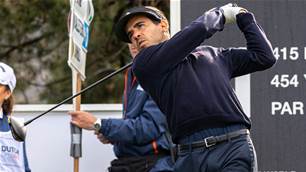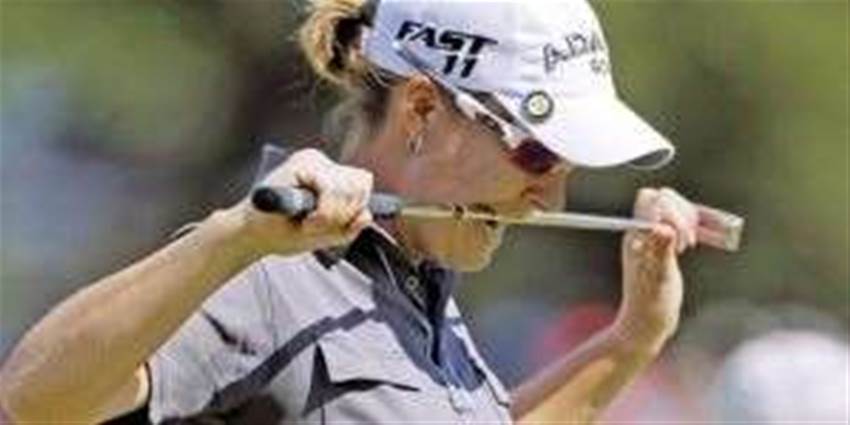Lindsey Wright's win in the Women's New Zealand Open recently was described as a "Victory out of the wilderness".
Lindsey Wright's win in the Women's New Zealand Open recently was described as a "Victory out of the wilderness". But as she reveals here, she was completely lost as depression drove her to the verge of quitting the game.
Lindsey Wright headed into the second round of the 2009 LPGA Championship just two shots behind Sweden’s Anna Nordqvist and in serious contention for her first major title. Having finished fourth at the opening grand slam event two months earlier, Wright looked impressive as she and the Tour rookie went toe-to-toe in a memorable shoot-out for the title. The pair exchanged several birdies down the stretch but in the end Nordqvist’s putter proved the difference and she claimed the trophy by four shots.
Wright’s runner-up performance propelled her to the edge of the top-10 in the world ranking and many, including this writer, had her tagged as a major champion in waiting. That was June 2009. By the end of September, Wright’s motivation for the game was fast evaporating but she played on – a decision she looks back on today, shakes her head and says “that was a mistake … I was done, I should have come home but I kept going. It was the beginning of the end”.
When Wright called a close to her 2009 season at the end of November she had played 24 LPGA events and a host of other tournaments and accrued more than $750,000 in prizemoney for the year. It had been her breakout year on the Tour and should have been celebrating when she arrived back home in Albury, on the NSW/Victorian border, to stay with her parents, Len and Linda. Instead, she went to bed feeling mentally and physically spent. She now knows it was the start of her slide into a major battle with depression.
“The end of 2009, that was when I really fell,” Wright recalls. “I overdid things that year. I had managed to keep going and then in September … I was done. I should have taken time off then and come home and put my mind, my body and health first.
“Looking back now that was when I was being overtaken by depression. That was when I couldn’t get out of bed and that continued throughout the whole of 2010 and into the start of last year.
“2009 had been a great run but I got to the point where I just thought, ‘What am I doing this for?’ I wasn’t happy, I did have some good friends looking out for me but I kept thinking, ‘Is this it? Is this what I’m working for?’ When I finished second in the LPGA it was a bit of an anti-climax for me. I finished runner-up and was disappointed but I also questioned whether that was what I was working hard for. It crushed my spirit.
“But I stayed out there and being on Tour … it’s very competitive and impersonal. I should have come home and when I didn’t straight away that kind of set the ball rolling towards having a breakdown.”
That breakdown came nearly 12 months later.
Wright struggled through 2010, playing no more than three LPGA events in a row in a season of just 16 tournament starts. Amazingly, considering all the turmoil she was going through off the course, she still managed one top-10 and only missed four cuts for the year to finish 60th on the LPGA money list.
“My golf suffered because I couldn’t concentrate, I couldn’t focus,” Wright says. “The end of 2010 couldn’t have come quick enough.”
Again, she returned to the sanctuary of her parents’ home and went to bed for five weeks.
“My depression really came to a head at Christmas in 2010 when I had a bit of a breakdown,” Wright says. “My parents were really worried. My anxiety was through the roof, my brain wouldn’t stop. There were times when I could not sit still and other times I couldn’t get out of bed. My behaviour was not normal and as far as communicating with people, I just didn’t want to.
“Then there was the crying. I kept crying … not in front of anyone, I had to keep leaving the room because I’d get very emotional for no reason. I’d be sitting there, relaxing and then I would just start crying and it felt like my chest was going to explode. I’d wake up, if I even got to sleep, at two in the morning and just start crying.
“Then there were days when I just didn’t want to wake up …
I was completely lost and knew I had hit bottom. There had been a lot of other moments before that, when I was on the road, in a hotel somewhere and I’d get anxious and start freaking out.
“It got so bad I couldn’t get any enjoyment out of anything. The only thing that really gave me some joy was seeing my niece and nephew. It was bloody horrible.”
Looking back now, Wright recognises the longer she went without having her depression diagnosed the greater the toll it was taking on her health, her family and her career.
“One of the hardest things to deal with when you’re dealing with depression is you don’t have a routine,” she says. “And because you’re a golfer, your career, making money is all based on your self-discipline … your motivation. “When you suffer from depression you lose every ounce of any form of motivation you might have once had.
“One day when I was home I went out to the course with my Dad and I hit two balls and said, ‘I’m done, I’m over it, I don’t want to do it.’ I just couldn’t, even physically, swing the club anymore. I just snapped at him and I felt sorry for him. It was difficult for my family because they’re left asking, ‘Where did my child, my shining light, go?’ My parents were extremely worried and kept saying, ‘We don’t know what to do.’
“I just thought that was the end of my career. We were heading into the start of the 2011 ALPG season and I didn’t want to go, didn’t want to play in anything. I was exhausted, mentally exhausted all the time. I was grappling with my career and lost motivation for everything. And then there was that fear of what am I going to do if I don’t play golf?”
Adding to her frustration and angst was not knowing why she felt so bad and how every day was getting harder and harder to deal with.
 “You might go and see a doctor with something like a broken arm and at that time I wish I had a broken arm because it would have been dealt with and I would have known how long it would go for,” Wright says. “But with depression, it just kept going and going … it was awful. The negativity you have, it’s like you’re walking around with somebody on your back dragging you down.
“You might go and see a doctor with something like a broken arm and at that time I wish I had a broken arm because it would have been dealt with and I would have known how long it would go for,” Wright says. “But with depression, it just kept going and going … it was awful. The negativity you have, it’s like you’re walking around with somebody on your back dragging you down.
“I now know that I had probably been battling depression since about 2003. In a career like golf, where you’re uprooted all the time and with my personality, I’m a bit of a home-body, it just snowballed over time. Being in the US too, the people are not as embracing as they are here and they leave you to your own devices, which I find isolating. But it also meant no one recognised the signs I had a problem … With depression, people think you’re just in a bad mood and when you’re on Tour most people only see you for a week and then you’re gone, off to the next event.”
The turning point for the 32-year-old came early last year when a close friend convinced her to seek medical help. She saw her GP in Sydney who “put me on to the right people”.
“I went to a psychiatrist and missed a few tournaments before I started on some medication to help me. But just to get a diagnosis was huge,” she says with a smile.
“I was prescribed some mediation and the doctor said it would take effect within six weeks. But with me it took a day … I instantly felt better.
I wasn’t anxious and my brain stopped going at a million miles a minute.
“It’s the best I have felt since about 2003 … as far as my own personal happiness, being more consistent with my personality. I always thought I was just quick-tempered but I would just snap, and it’s not nice to be around someone who is like that.
“I l ook back now and think, “Bloody hell, how did I live with it for so many years?’”
ook back now and think, “Bloody hell, how did I live with it for so many years?’”
Wright’s battle with the ‘black dog’, her diagnosis and recovery has helped change her life perspective on and off the course. There is a sense as she talks how a huge weight has been lifted off her shoulders and with that she’s itching to start living life to the full.
“I’ve always felt I had a pretty good perspective with things in life but my perspective on my life and where it’s going and what I want out of life has changed,” she says.
“I used to put so much pressure on myself to perform well and being a woman it is harder because the clock is ticking all the time. I’m 32 and I really would like to settle down and have a family and I think that played on my mind too, where I was thinking, ‘I’m stuck on this Tour, I’d go home, see my friends and they’re happy with kids and I’m out here miserable.’
“The way I look at it now and the way I want to lead my life is more for me. I’ve earned the right to really enjoy my life and I’ve made enough money to enjoy it, instead of putting so much bloody pressure on myself to win. That is something that has really changed a lot. I’m a lot more comfortable in my own skin than I was two years ago.
“A lot of people have asked me, ‘What have you been doing, where have you been?’ and I kind of danced around it because I don’t really want to say ‘woe is me’. I didn’t want to make a big deal out of it but I think it’s important to be honest.”
With the pressure valve off, Wright returned to tournaments in January this year after a four-month lay-off and immediately impressed with top-ten finishes in the Canberra Classic, NSW Open and Australian Ladies Masters.Then, in February, she teed up in the final ALPG event of the 2011-2012 season – the ISPS Handa New Zealand Open, which was co-sanctioned with the Ladies European Tour.
After rounds of 70 and 68, Wright shared the lead heading into the final round and, despite a double bogey scare with five holes to play, she nailed a 15-footer at the last hole to claim the title by one shot.
“It was awesome to get my hands on the trophy. It had been eight years since I last won … even weeks after it didn’t seem to have sunk in that I had won,” she laughs.

“I guess I have been in a position where I have always been the bridesmaid and never the bride, so to speak, and you kind of get used to it, which is probably not the best way to think but it’s good to win a tournament. What it has done is change my psyche a bit as far as being in that position and saying to myself, ‘Hey, hang on I can win this.’”
When I suggest, “Bet you’re glad you didn’t go through with quitting last year,” Wright bursts into laughter.
“Yeah, it’s funny … I was going to quit and now I’ve won this bloody tournament and have exemptions in America and Europe,” she laughs.
“I was pretty nervous coming down the stretch there … would have loved a glass of wine coming down the stretch.
“I caddied for myself for two days and then my good friend Vicky Uwland-Thomas (fellow Tour player) jumped on the bag. She was as stressed out as I was, I think.
“We were both quite nervous and I knew that, for me, it was just a matter of controlling my breathing. If I didn’t I knew I would get tense in the shoulders and start making mistakes. I was staying in the moment, doing the right things, doing what I had been doing for six weeks.”
She now hopes the momentum and confidence gained from the win will translate into her performances abroad this year. After a three-month campaign on the LPGA, Wright plans to head to Europe in July to play the big events there and enjoy the new experiences that Tour will present.
“I’m now a part of the Ladies European Tour and I’m so excited because I know a lot of the girls and I like the people,” she says. “To be honest, I like a challenge and I guess it’s like a lot of things; you get fed up with doing the same thing all the time. Playing on the LPGA has become a bit tedious the past few years, so going to Europe has got a bit of the fire going inside (me).
“I’ve really enjoyed my time in the US and I would never ever spit in the face of the opportunities it has given me, but I’m also an Aussie country girl and where I grew up people talk, go out for a beer without any drama. It’s a bit too dramatic in the States for me.”
Wright has been playing golf in the United States since she left the Australian Institute of Sport golf program in 1999 to attend Pepperdine University in Los Angeles. She turned professional in 2003 and played on the Futures Tour and gained her promotion to the LPGA Tour the following year. Wright says had she not qualified for the LPGA straight away she would have gone to Europe back then because of the camaraderie that existed, and still does, between the players and is something she says is sadly lacking on the LPGA.
“I look at golf as a whole. I’m not a golf freak, it’s not just about golf,” she says. “I feel the major factor of going to Europe is the people and the culture of the Tour. If I’m not around fun people or people with some energy and enthusiasm it wears me down and I have certainly felt that being in the US for so long. Playing this game is not about the money for me, it’s about the overall enjoyment of playing … and doing it under five-and-a-half hours.
“They say money is the root of all evil. Some girls start in Europe, then head to the LPGA, but they head back to Europe because they realise they’d rather play for 30 or 40 percent less money than on the LPGA and be happy. The competitive, cut-throat culture of the LPGA gets to them.
“The US is a good place to earn your money, it’s the best and most competitive women’s Tour in the world but it comes to a point where you want to enjoy your life as well. Being happy is important.
 “LET players work as hard as the LPGA players but when they get off the course, the clubs get put away and they all socialise together … It’s like, ‘Which pub tonight?’ or, ‘Where will we eat on Saturday night?’ I don’t think I’ve met one player who disliked playing in Europe. I’m so looking forward to going down that path.”
“LET players work as hard as the LPGA players but when they get off the course, the clubs get put away and they all socialise together … It’s like, ‘Which pub tonight?’ or, ‘Where will we eat on Saturday night?’ I don’t think I’ve met one player who disliked playing in Europe. I’m so looking forward to going down that path.”
On the course, her game is in a better place than it was. She has a renewed enthusiasm for practice and playing and Wright says time away from the game has added a new weapon to her playing strategy – patience.
“It is a cliché but I am playing within myself much more,” she explains. “For example, I know I hit a rescue club 176 yards and if I have a 180-yard carry I’m not going to bullshit myself and hit it, which is something I would have done before. Now, I’ll just lay-up and hit a wedge in for my next. I’m almost playing like a veteran and that’s been a big shift in the way I think on the golf course.
“For a while there I didn’t think I was good enough to compete alongside some of the younger players who hit it further and seem fearless. When really I haven’t fully utilised the strengths of my game, I’ve been operating at 50 percent. The likes of Michelle Wie and Brittany Lincicome … they hit it long for sure, but I can still beat them by playing smarter and using my experience.
“Since having this mental thing it’s definitely changed my outlook on the game. And I look at it and I have a laugh because it really is a crappy game to play. You have a day where you make all the putts and think, ‘I’m never going to shoot 75 ever again and everything is going to be under par,’ and then all of a sudden you come off the course with a 76. But you can’t let it beat you up because it’s something you can’t control.”
Most importantly Wright’s battle with depression is done. She’s healthy and her love of the game has returned, which her performances thus far in 2012 reflect.
“I play golf because I enjoy it. The minute I stop enjoying it my results will speak for themselves,” Wright says.
Related Articles

February 2025 Issue of Golf Australia magazine

Inside Golf Australia: December 2024













